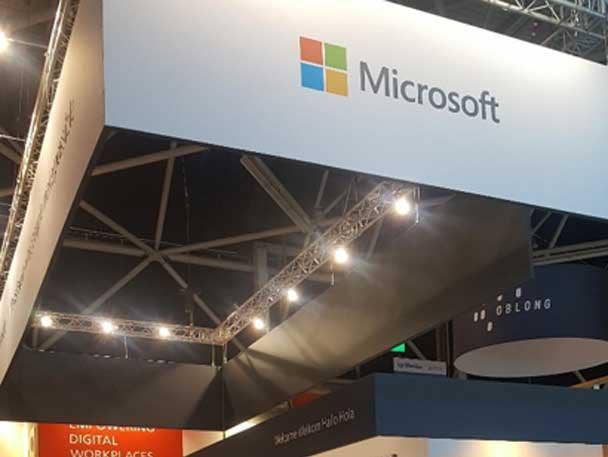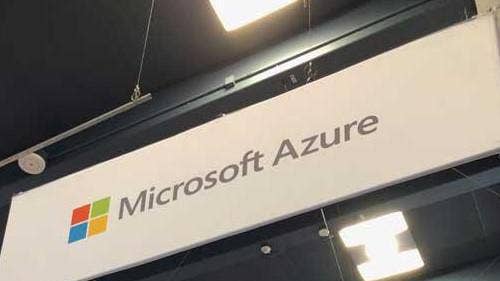Here Are The 6 Designations Replacing Microsoft’s Gold And Silver Competencies
CRN breaks down what partners need to do to earn a new designation. The six new designations are in infrastructure; data and artificial intelligence; digital and application innovation; modern work; security and business applications.

As partners continue to adapt to Microsoft’s New Commerce Experience, the company hit them with even more partner program changes in March, promising to scrap the long-available gold and silver competencies in favor of a batch of new designations for partners to stand out from the pack.
Here, CRN breaks down what partners need to do to earn a new designation. The six new designations are in infrastructure; data and artificial intelligence; digital and application innovation; modern work; security and business applications.
Microsoft partners will have to score a 70 or higher out of 100 in the new partner capability score to graduate from a base-level partnership with Microsoft and be recognized as a “solutions partner” in one of the six new designations.
[RELATED: Microsoft Introduces New Solutions Partner Score, Plans Program Name Change]
No partner incentive eligibility will change in the 2023 investments and incentives program year, which runs from October 2022 to September 2023, according to Microsoft. Internal use rights licenses (IURs) have also been renamed by Microsoft as “product benefits.”
Common benefits across all partner designations include go-to-market services, technical presales and deployment services (TP&D) advisory hours, technical support incidents.
Microsoft has also said that details about the program can change in the future.
Partners have until Sept. 30 to renew legacy competencies. Partners will retain their benefits through their next anniversary date but lose the associated badging come October.
On Oct. 3, partners need to meet the partner capability score threshold to get their solutions partner designations. No more legacy competency renewals will be processed.
Partners have had a mixed reaction to the scores. Some have told CRN they applaud Microsoft making its partner program tougher, created more value in its designations. Some have called the new scores “impossible” to achieve.
Here’s what you need to know.

Solutions Partner For Infrastructure (Azure)
Partners with gold and silver competencies in cloud platform and data center will want to look into becoming “solutions partner for infrastructure (Azure).”
These partners can get to 70 points in a variety of ways. They can earn 30 points with three net customer adds, which counts as a customer with Azure consumed revenue of at least $1,000 a month for the trailing twelve months. Customers that have Azure consumed revenue of less than $1,000 a month for two straight months during the period count against the partner.
The paths to 70 points are similar for solutions partners for data and AI and solutions partners for digital and application innovation.
Partners can earn 20 points for five employees achieving certain intermediate certifications, which are Azure Network Engineer Associate, Azure Stack Hub Operator Associate or Windows Server Hybrid Administrator Associate. To qualify, the partner needs at least three Azure Administrator Associate certifications.
Solutions partners for infrastructure can get 20 points if five people get qualifying advanced certifications, which are Azure Virtual Desktop Specialty or Azure for SAP Workloads Specialty. To qualify, the partner needs at least three certified Azure Solutions Architect Experts.
Infrastructure solutions partners can get 20 points from 20 percent growth year over year in Azure consumed revenue (ACR). This requires a minimum threshold of $1,000 in Azure consumed revenue.
These partners can get 10 points from deployments. Partners need five unique top-level, Service Level 2 Azure workloads from all customer tenant deployments. All Azure services are eligible except virtual machines and virtual machines licenses.
Benefits for solutions partners for infrastructure include $6,000 a year in Azure production credits, $12,000 a year in Azure development and test credits and 25 Visual Studio Enterprise subscriptions. These partners also qualify for partner sandboxes for D365 Operations Application, Sales, Field Service and Customer Service.
Other benefits for digital and app innovation partners include 100 Power Bi Premium users, 100 M365 E3 users, 20 Microsoft Project Online users, five Microsoft Visio Online users, two Windows IoT software licenses, 100 Windows Server Standard 2022 licenses, 32 Windows Server 2022 Data Center licenses, 16 SQL Server licenses, 100 System Center Standard licenses, select client-access licenses (CALs) and more.
If partners get a specialization in Azure infrastructure, they receive $12,000 a year in Azure production credits, $24,000 a year in Azure development and test credits, another 10 Visual Studio Enterprise subscriptions and another 30 M365 E3 users.
Specialized solutions partners for digital and application innovation can also participate in Microsoft-led Azure immersion workshops (AIW) and become a “solution assessment” provider to reach new customers, support strategic objectives and grow the business. They can participate in the Azure Migration and Modernization Program (AMMP) and receive targeted financial incentives.
These are the same benefits for solutions partners for data and AI and solutions partners for digital and application innovations. Specializations for all three designations also come with the same benefits.

Solutions Partner For Data & AI (Azure)
The new “solutions partner for data and AI (Azure)” designation replaces the gold and silver competencies for application integration, data analytics and data platform.
Like with solutions partners for infrastructure and solutions partners for digital and application innovation, data and AI partners can score 30 points with three net customer adds, 20 points for five employees achieving certain intermediate certifications, 20 points from 20 percent growth year over year in Azure consumed revenue (ACR) and 10 points for five unique, top-level, Service Level 2 Azure workload deployments over the trailing twelve months.
The qualifications for net customer adds, Azure consumed revenue growth and Azure workload deployments are the same for solutions partners for infrastructure, solutions partners for digital and application innovation and solutions partners for data and AI.
For each of these three partner designations to get points from intermediate certifications, the partner already needs three certified Azure Administrator Associates to qualify. To get points for advanced certifications, the partner already needs three certified Azure Solutions Architect Experts to qualify.
The intermediate certifications that count for points for data and AI partners are Azure Database Administrator Associate, Azure AI Engineer Associate, Azure Data Scientist Associate, Azure Data Engineer Associate and Data Analyst Associate.
The advanced certifications that count for points for data and AI partners are Customer Data Platform Specialty and Azure Cosmos DB Developer Specialty.
The benefits for data and AI partners are the same as those for infrastructure and digital and application innovation partners. Specializations for all three designations also come with the same benefits.

Solutions Partner For Digital And App Innovation (Azure)
Partners who qualified for gold or silver in application development, application integration and development operations (DevOps) will likely look to earn a “solutions partner for digital and app innovation (Azure)” designation.
Like with solutions partners for infrastructure and solutions partners for data and AI, digital and app innovation partners can score 30 points with three net customer adds, 20 points for five employees achieving certain intermediate certifications, 20 points from 20 percent growth year over year in Azure consumed revenue (ACR) and 10 points for five unique, top-level, Service Level 2 Azure workload deployments over the trailing twelve months.
The qualifications for net customer adds, Azure consumed revenue growth and Azure workload deployments are the same for infrastructure partners, digital and app innovation partners and data and AI partners.
For each of these three partner designations to get points from intermediate certifications, the partner already needs three certified Azure Administrator Associates to qualify. To get points for advanced certifications, the partner already needs three certified Azure Solutions Architect Experts to qualify.
The intermediate certifications that bring points to digital and application innovation partners are Azure Developer Associate and Power Platform Developer Associate. The advanced certifications that count for points are Azure IoT Developer Specialty, Azure DevOps Engineer Expert and Power Platform Solution Architect Expert.
The benefits for solutions partners for digital and application innovation are the same as those for solutions partners for infrastructure and solutions partners for data and AI. Specializations for all three designations also come with the same benefits.

Solutions Partner For Modern Work
Replacing the largest number of gold and silver competencies, the new “solutions partner for modern work” designation takes the place of six separate competencies. Those competencies are cloud productivity, collaboration, communications, messaging, small and midmarket cloud solutions, and Windows and devices.
Microsoft has different rules for reaching 70 points and qualifying as a modern work partner depending on whether a partner business targets enterprises or small- to medium-sized businesses.
Eligible products for points for modern work partners include Intune, Exchange, ProPlus, Sharepoint, Teams, Teams Calling, Teams Meetings, Teams Phone, Teams Platform, and Yammer.
Partners of any size can earn 20 points for net customer adds, 10 points for intermediate certifications, 15 points for advanced certifications, 30 points for usage growth and 25 points for deployments.
Partners that target smaller businesses can get the 20 points for net customer adds with 10 customers added during the trailing 12 months. Customers count if their paid available units (PAUs) for at least one eligible workload is more than 10 and at most 300. If they are more than 300, then the customer is considered an enterprise.
Modern work partners that target enterprises can get the 20 points for net customer adds for five customers added during the trailing 12 months. Customers count if their paid available units for at least one eligible workload is more than 300.
Customer adds must be deduped to avoid multiple credits for a single customer with multiple association types.
For modern work partners that target smaller businesses and want the full 10 points for intermediate certifications, they must have two employees with at least one of the following certifications: Microsoft 365 Fundamentals, Managing Modern Desktops, Microsoft 365 Certified: Messaging Administrator Associate, Microsoft 365 Certified: Teams administrator associate and Microsoft 365 Certified: Developer Associate.
The number of employees increases to four for partners that target enterprises.
If modern work partners who sell to smaller businesses are trying to get the full 15 points for advanced certifications, they only need one person to be a Microsoft 365 Certified: Enterprise Administrator expert. Partners targeting enterprises need two people with the certification.
How modern work partners earn the 30 points for usage growth further depends not only on what kind of customer they target, but also their partner association type.
The partner association type that earns the most points will count for the partner, but partners cannot earn points from multiple association types for one metric.
For modern work partners targeting small businesses – businesses with paid available units between 10 and 300 – if the partner is in the Cloud Solution Provider program, it needs at least growth of 2,000 monthly active users year over year. Claiming Partner of Record (CPOR) associations only need growth of 500 monthly active users year over year.
For partners targeting enterprises – businesses with paid available units of more than 300 – if the partner is a Claiming Partner of Record, the partner needs to grow more than 1,000 monthly active users. If the partner is a Direct Partner of Record, the partner needs to grow more than 4,000 monthly active users.
Partners targeting smaller businesses can get points from tenants with paid available units between 10 and 300. Paid available units of more than 300 makes a customer an enterprise, and thus they count for points for partners targeting large businesses.
Usage growth is calculated based on monthly active users at the time the workload or customer was claimed by or associated with the partner during the trailing 12 months. Partners don’t get credit for monthly active users that existed before the claim or association.
To earn the 25 points available for deployments growth for partners targeting smaller businesses, Claiming Partners of Record need five net new deployments and Cloud Solution Provider partners need 10 net new deployments.
For partners that target enterprise customers, Claiming Partners of Record need five net new deployments. Direct Partners of Record need 10 net new deployments.
Deployments are counted if the monthly active usage is more than 40 percent of paid available units in the given month. Microsoft does not count deployments that were already more than 40 percent at the time a partner claimed or became associated with the deployment.
Benefits available for modern work partners include $6,000 a year in Azure development and test credits, 25 Visual Studio Enterprise subscriptions, partner sandboxes for Dynamics 365 Operations Application, Sales, Field Service and Customer Service and 50 users for Microsoft Viva.
The benefits also include 200 M365 E5 users, 25 Business Premium users, 25 M365 EDU A5 users, five Windows 365 Enterprise users, 20 Microsoft Project Online users, five Microsoft Visio Online users, two Windows IoT software licenses, 100 Windows Server Standard 2022 licenses, 32 Windows Server 2022 Data Center licenses, 16 SQL Server licenses, 100 System Center Standard licenses, select client-access licenses (CALs) and more.
Partners can get a modern work specialization to qualify for $4,500 a year in Azure production credits. Specialized partners also double the Azure development and test credits to $12,000 a year, get an additional 10 Visual Studio Enterprise subscriptions, get an additional 50 Viva users and get an additional 50 M365 E5 users.
Specialized modern work partners also get prioritized access to Microsoft programs including the Microsoft Cloud Accelerator Program, which funds delivery of partner-led workshops to create customer intent to purchase and deploy.
Specialized partners also have prioritized access to engineering-supported partner communities that provide partners with information on product roadmaps and deep technical training plus incubation programs to test partner development and go-to-mMarket approaches for new M365 apps and services.

Solutions Partner For Security
The “solutions partner for security” designation is meant to replace Microsoft’s enterprise mobility management and security gold and silver competencies.
The path to 70 points to reach this new designation includes 10 points available for at least five net M365 customer associations or adds in the trailing 12 months. Partners can also get 10 points for at least five net Azure customer adds in that time period for a total of 20 points.
Eligible M365 products include Azure Active Directory Premium (AADP), Microsoft Defender for Office 365 (MDO), Microsoft Defender for Endpoints (MDE), Microsoft Defender for Identity (MDI), Microsoft Information Protection (MIP) and Intune.
Eligible Azure products include Sentinel, Azure Defender, Network Security, Identity and Access Management.
To count as a net new M365 customer, the customer must have a unique tenant identifier and must go from zero paid seats the prior month to 25 paid seats in the current month.
Customers that had 25 paid seats the prior month and went to zero in the current month are considered lost customers and count against the security partner.
To count as a net new Azure customer, the customer must have a unique top parent identifier (TPID) and go from a monthly average of less than $25 in Azure security consumed revenue the prior year to a monthly average of at least $100 in consumed revenue for the trailing 12 months.
Customers that go from a monthly average of $100 in Azure security consumed revenue the prior year to a monthly average of less than $25 in consumed revenue for the current trailing 12 months are considered lost customers and count against the partner.
Security partners can get 40 points for six engineers with certain certifications. The employees must have the Microsoft 365 Security Administrator Associate and Azure Security Engineer certification. They must then choose to become a certified Microsoft Security Operations Analyst, Microsoft Identity and Access Administrator or a Microsoft Information Protection Administrator.
Although Microsoft plans to release an update that combines points for net M365 and Azure customer adds, deployments and usage growth, for now those achievements are kept separate for security partners. Monthly M365 protected users and Azure security consumption revenue are calculated at the end of every month.
For now, security partners can earn 10 points if they have at least three M365 customers with 15 percent of monthly protected users deployed. A deployment must have at least 25 paid seats in the current month in the production tenant environment.
Monthly protected users are counted per workload at the tenant level and summed up per workload across the paid subscriptions under the tenant. A tenant counts if it was below the threshold 12 months ago and crossed that threshold once or more during the trailing 12 months.
Security partners can get 10 points for three customers with more than $12,000 in Azure security consumed revenue during the trailing 12 months. Customers must have crossed the threshold at least once during the trailing months to count.
Security partners can get 10 points for 2,500-plus net total memory protection unit (MPU) growth for the trailing 12 months. They can also earn 10 points for at least $25,000 in net total Azure security consumed revenue growth during that period.
Benefits for security partners include $6,000 a year in Azure production credits, $12,000 a year in Azure development and test credits, 25 Visual Studio Enterprise subscriptions and partner sandboxes for Dynamics 365 Operations Application, Sales, Field Service and Customer Service.
Security partners also get 50 users for Microsoft Viva, 100 M365 E5 users, 12 Business Premium users, 25 M365 EDU A5 users, two Windows 365 Enterprise users, 20 Microsoft Project Online users and five Microsoft Visio Online users.
Security partners also receive two Windows IoT software licenses, 100 Windows Server Standard 2022 licenses, 32 Windows Server 2022 Data Center licenses, 16 SQL Server licenses, 100 System Center Standard licenses, select client-access licenses (CALs) and more.
Partners can also qualify for the security specialization to increase the Azure production credits value to $9,000 a year, increase the Azure development and test credits to $24,000 a year, an additional 10 Visual Studio Enterprise subscriptions and an additional 50 M365 E5 users.
Like specialized business apps partners, specialized security partners also get a label to display on Microsoft AppSource profiles, higher commercial marketplace rankings and evaluation for cooperative selling opportunities with Microsoft field sellers.

Solutions Partner For Business Applications
Partners with the cloud business applications, enterprise resource planning and project portfolio management competencies will likely look to the new “solutions partner for business applications” designation come October.
Business apps partners have multiple paths to reaching the 70 points to become a solutions partner for business applications.
U.S.-based business apps partners can earn 15 points with 15 net new customer adds for certain Dynamics 365 and Power Platform sales. The customer must have an active subscription and adjusted workload revenue of more than $1,500. Multiple partners can get credit for new workloads under a shared customer in the same one-year period. Net customers are added across all sales channels including Enterprise Agreement (EA), Cloud Solution Provider (CSP), and Web Direct.
Accepted products for business apps partners to earn points through include AI Builder, Business Central, CE Bundle, Commerce, Customer Insights, Customer Service, Customer Voice, F&O Bundle, Field Service, Finance, Fraud Protection, Marketing, Mixed Reality, Power Apps, Power Automate, Power Virtual Agent, Project Operations, Sales and Supply Chain.
American business apps partners can earn up to 20 points if 20 functional consultants and developers gain certain intermediate certifications. Business apps partners can earn 15 points if seven employees get solution architect certifications.
Qualifying intermediate certifications for business apps partners include Microsoft certified Power Platform developer associates, Dynamics 365 finance and operations applications developer associates and Dynamics 365 supply chain management, manufacturing functional consultant associates.
American business apps partners can get 20 points for 10 Dynamics 365 or Power Platform production deployments with a minimum monthly consumption value of 10,000. The deployment must cross the consumption value during the trailing 12 months.
They can get 30 points for monthly consumption value growth of 30 percent or more across all customers. Consumption value growth comes from more monthly active users or capacity multiplied by consumption rate across the customer base over the past 12 months.
Monthly consumption is calculated at the end of each month. U.S.-based partners must have a baseline of at least 100,000 consumption value units the 12 months prior.
Benefits for business apps partners include $6,000 a year in Azure development and test credits, 25 Visual Enterprise subscriptions with no monthly Azure credit and 100 users for Dynamics 365 Finance, HR, Project Ops, Sales and other products.
Business apps partners also receive one tenant for Dynamics 365 Marketing and Customer Insights plus Dynamics 365 partner sandboxes.
Business apps partners also receive 100 Power BI Premium users, 100 Microsoft 365 E3 users, 20 Microsoft Project Online users and five Microsoft Visio Online users. They also receive two Windows IoT software licenses, 100 licenses for Windows Server Standard 2022, 32 licenses for Windows Server 2022 Data Center, 16 licenses for SQL Server, 100 licenses for System Center Standard, select client-access licenses (CALs) and more.
Partners who achieve a business applications specialization receive $4,500 a year in Azure production credits plus $12,000 a year in Azure development and test credits.
Specialized business apps partners get another 10 Visual Studio Enterprise subscriptions and another 25 users for Dynamics 365 Finance, HR, Project Ops, Sales and more.
Like specialized security partners, specialized business apps partners also get another 50 Microsoft 365 E3 users, a label to display on Microsoft AppSource profiles, higher commercial marketplace rankings and evaluation for cooperative selling opportunities with Microsoft field sellers.